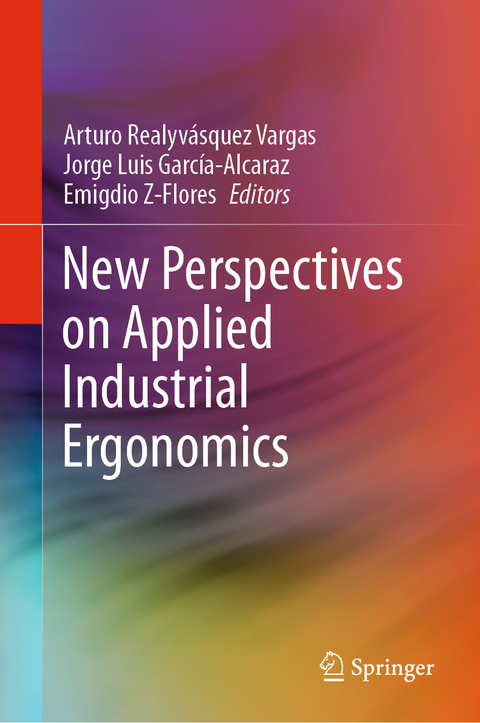
New Perspectives on Applied Industrial Ergonomics
Springer International Publishing (Verlag)
978-3-030-73467-1 (ISBN)
This book reports the most recent, advanced, successful, and real applications of ergonomics in order to improve the human well-being and performance in a short term, as well as the organizational performance in a long term. The book is organized as follows:
Physical Ergonomics. This section reports case studies where physical risk factors are presented in the workplace, such as physical risk factors including uncomfortable body postures, repetitive movements, force application, manual material handling, and physical environmental conditions. In addition, case studies must report applications from physical ergonomics methods, for instance, RULA, REBA, OWAS, NIOSH, JSI, Suzane Rodgers, ERIN, among others.
Macro-ergonomics. This section is focused on the analysis, design, and evaluation of work systems. It reports case studies where risk factors are beyond a specific workstation. These risk factors may include supervision styles, teamwork management, task variety, social relationships, organizational culture, organizational communication, technology, work schedules, and motivation, among others. In addition, case studies report the application of macro-ergonomic methods, such as MOQS, focus group, participatory ergonomics, HITOP, MAS, and MEAD, among others.
Arturo Realyvásquez Vargas is a full-time professor from the Department of Industrial Engineering at Tecnológico Nacional de Mexico/Instituto Tecnológico de Tijuana in Mexico. He received a master's degree in Industrial Engineering and a Ph.D. in Engineering Sciences from the Autonomous University of Ciudad Juarez in Mexico. Currently, he is studying a Ph.D. in Innovation in Product Engineering and Industrial Process at the University of La Rioja (Spain). In addition, his main research areas are related to the optimization of industrial processes, lean manufacturing, and ergonomics. He is an active member of the Society of Ergonomists of Mexico Civil Association (Sociedad de Ergonomistas de México, SEMAC) and the Network of Optimization of Industrial Processes (Red de Optimización de Procesos Industriales, ROPRIN). Currently, Dr. Realyvásquez is National Researcher recognized by the National Council of Science & Technology of Mexico (CONACYT) as Candidate. Furthermore, Dr. Realyvásquez is an author/coauthor in around 12 papers published in journals indexed in the Journal Citation Reports, and he has attended two international conferences and congress in Mexico as well as in the United States of America.
Nowadays, Dr. Realyvásquez has supervised more than 20 bachelor theses and 5 master theses. In addition, Dr. Realyvásquez is the author of one book published by the international publisher Springer, related to ergonomics. Also, Dr. Realyvásquez has edited two books in IGI Global, all of them related to ergonomics. ORCID: https://orcid.org/0000-0003-2825- 2595, Scopus Author ID: 56167726800.
Moreover, Dr. García has supervised more than 50 bachelor theses, 18 master theses, and 13 doctoral theses. He has 13 international patents and 1 industrial design in Mexico and Spain. Also, Dr. García is the author of several books published by international publishers as Springer and IGI Global, all of them related to lean manufacturing, its tools, and techniques, kaizen, supply chain, and just-in-time philosophies. Finally, Dr. García was the winner of the Chihuahua State Science and Technology Award in 2015, and nowadays, he is a member of several doctoral committees in universities from Mexico, Colombia, and Spain. ORCID: hhtp://orcid.org/0000-0002-7092-6963, Scopus Author ID: 55616966800. Web of Science ResearcherID: N-9124-2013
1. Two Groups of Patented Devices for Carpal Tunnel Syndrome Re-habilitation. Comparative Study Between Traditional and Additive Manufacturing.- 2. A Review on Infrared Thermal Imaging as a Tool in Carpal Tun-nel Syndrome.- 3. Mental Workload Management and Evaluation: A Literature Re-view for Sustainable Processes and Organizations.- 4. Ergonomic Control Panel (ECP): A Proposed Comprehensive Er-gonomics Evaluation Tool Using Multi-Task Evaluation Models.- 5. Fatigue Study among 12-Hour and 7-Hour Night Shift Workers in the Manufacturing Industry.- 6. Different Conceptions of Burnout and Its Relationships with Job Strain and Emotional Intelligence.- 7. Ergonomics Implementation in Manufac-turing Industries: Man-agement Commit-ment for Financial Benefits.- 8. Applying Hierarchical Task Analysis (HTA) to Identify Ergonom-ic Risks in Exhibition Booths Set-Up Process.- 9. Ergonomic Evaluation of Localized Manufacturing Concerns for Agricultural Appliances in Odisha (India).- 10. Minimization of Ergonomic Risk in Autovend. Case Study: Bread Company
| Erscheinungsdatum | 17.06.2021 |
|---|---|
| Zusatzinfo | XXVI, 313 p. 113 illus., 92 illus. in color. |
| Verlagsort | Cham |
| Sprache | englisch |
| Maße | 155 x 235 mm |
| Gewicht | 667 g |
| Themenwelt | Technik ► Maschinenbau |
| Schlagworte | Applied Ergonomics • Applied Macro-ergonomics • Engineering Economics • Ergonomic Assessment • ergonomic design • Ergonomics in Industrial Processes • Human Resource Optimization • Physical and Cognitive Ergonomics • Quality Control, Reliability, Safety and Risk |
| ISBN-10 | 3-030-73467-6 / 3030734676 |
| ISBN-13 | 978-3-030-73467-1 / 9783030734671 |
| Zustand | Neuware |
| Haben Sie eine Frage zum Produkt? |
aus dem Bereich


